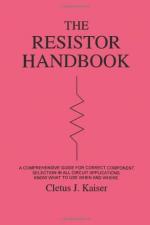|
This section contains 526 words (approx. 2 pages at 300 words per page) |

|
A resistor is a component of an electric circuit that resists the flow of current and protects delicate electronic equipment from surges. The resistor allows a specific amount of current to pass, but inhibits a high voltage spike that could cause damage to other components. Most resistors are of a fixed value, but others, called a rheostat, are tunable.
In 1827, Georg Simon Ohm (1789-1854) experimented with resistance and found that the amount of current which was transmitted through a conductor was inversely proportional to the length and directly proportional to the thickness of the conductor. This relationship between the amount of current I, the electric potential V, and resistance R became known as Ohm's Law, famously written asV=IR. Today, in Ohm's honor, the value of resistance is measured in ohms. ( Henry Cavendish (1731-1810) discovered this same relationship nearly 50 years earlier, but he failed to publicize it and...
|
This section contains 526 words (approx. 2 pages at 300 words per page) |

|


